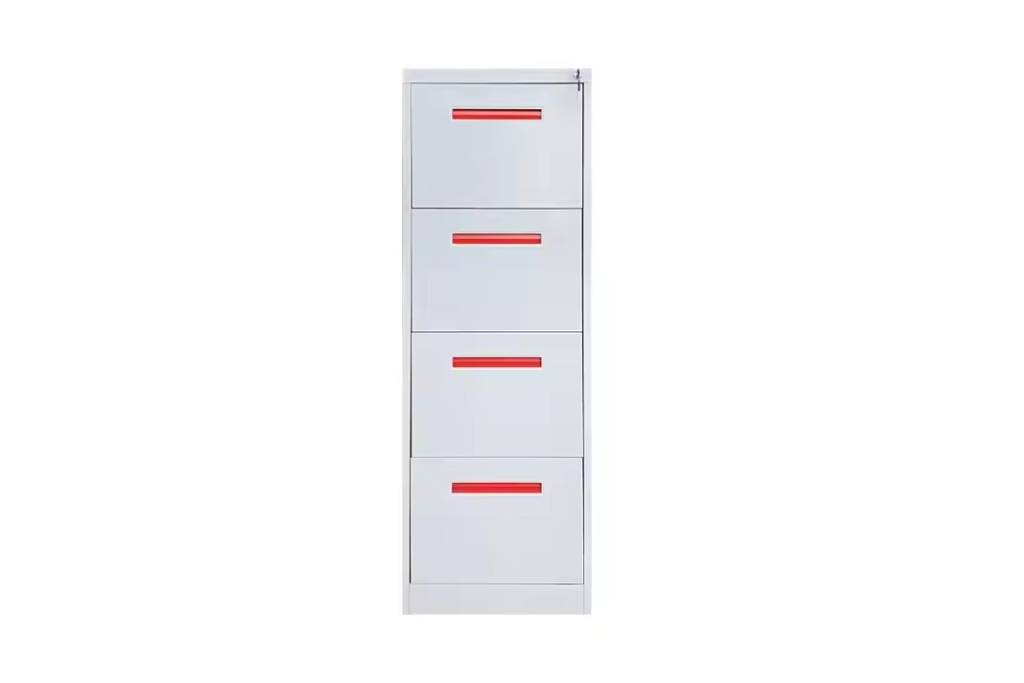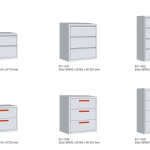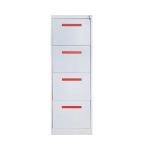2, 3, and 4-drawer file cabinets offer varying levels of storage, and selecting the right one can significantly impact your workspace efficiency.
Choosing the right file cabinet is like picking a pair of shoes: Too small, and you’ll suffer. Too big, and they’ll gather dust. With 72% of offices still relying on physical document storage, selecting the perfect drawer count can save you space, money, and daily frustration. Let’s break down your decision with a data-driven checklist.
The 5-Question Pre-Purchase Checklist
Answer these first to narrow your options:
1. “How much floor/wall space do I have?”
2-drawer: Fits under desks (avg. 28" height).
3-drawer: Requires 34" vertical clearance.
4-drawer: Needs 48" height + 30" front clearance.
2. “What’s my weekly file access frequency?”
Daily access → Prioritize 2-3 drawers (top/middle placement).
Monthly/archival → 4-drawer bottom compartments.
3. “Are my documents sensitive?”
Confidential files → Locking 3/4-drawer models.
General use → Basic 2-drawer suffices.
4. “Will I need to move this cabinet?”
Steel 4-drawer: 150+ lbs (requires dollies).
Plastic 2-drawer: 25 lbs (portable).
5. “What’s my budget?”
2-drawer: $50–150
3-drawer: $150–400
4-drawer: $300–800+
Drawer-by-Drawer Breakdown
2-Drawer File Cabinets
Best for: Home offices, freelancers, temp storage.
Key Stats: Capacity 200–500 sheets (1–3 months of active files); Space 18" W × 28"H – Fits under standing desks.
When to Avoid: Storing legal-size files (most lack 15"+ depth); Team/shared environments (low security).



3-Drawer File Cabinets
Best for: Small businesses, HR departments, clinics.
Key Stats: Capacity 800–1,200 sheets (6–12 months); Space 20" W × 34"H – Ideal beside desks.
Pro Tip: Choose models with a flat top (34% of office workers use it as a printer stand).



4-Drawer File Cabinets
Best for: Law firms, hospitals, engineering teams.
Key Stats: Capacity 2,000–5,000 sheets (multi-year storage); Space 30" W × 48"H – Requires dedicated floor area.
Critical Feature: Ensure full-extension drawer slides – Standard drawers only open 75%, risking misfiled docs.



Multi-dimensional Comparison
| Factor | 2-Drawer | 3-Drawer | 4-Drawer |
| Dimensions (H×W×D) | 28"×18"×16" (Typical) | 34"×20"×18" (With Top Workspace) | 48"×30"×22" (Vertical Storage) |
| Material | Plastic/light steel | Medium-gauge steel | 16–18-gauge steel |
| Lock Types | Basic cam lock | Central lock | Dual-point deadbolt |
| Drawer Weight | 30–50 lbs | 60–80 lbs | 100–150 lbs |
| Extra Costs | Wheel kit ($15) | File rails ($20) | Fireproofing ($200+) |
| Capacity | Holds 200-300 sheets of standard paper | Supports 500-800 sheets + small item layered storage | Can hold 1000+ sheets or materials of various sizes |
| Suitable Space | Under desk / Corner | Next to independent workstation / Corridor | File room / Department shared area |
| Weight Capacity | Single drawer ≤ 50 lbs | Single drawer ≤ 80 lbs (Heavy-duty tracks) | Single drawer ≤ 120 lbs (Commercial-grade steel) |
3 Costly Mistakes to Avoid
Ignoring File Sizes: Legal/ledger files require 18"–22" deep drawers (rare in 2-drawer units).
Overlooking Workflow: High-traffic offices need soft-close drawers – slamming noise reduces productivity by 11%.
Forgetting Compliance: HIPAA/CFR compliance mandates locking 4-drawer cabinets for medical/legal docs.
The Hybrid Solution
Can’t decide? Combine:
2-drawer under desk (daily files) +
4-drawer in storage room (archives).
Cost Saver: Look for stackable 2-drawer units.
Your Final Decision Tree
Space-Strapped? → 2-drawer.
Balanced Needs? → 3-drawer.
High Volume/Security? → 4-drawer.
Still unsure? Measure your:
Wall space: 4-drawers need 30"+ from walls for airflow.
File weight: Heaviest doc batch × 1.5 = Required drawer capacity.
Bottom Line:
The “right” cabinet depends on your workflow, not just size. A 3-drawer might cost 2× a 2-drawer, but if it saves 15 minutes daily, that’s 65 hours/year regained. Choose wisely!





